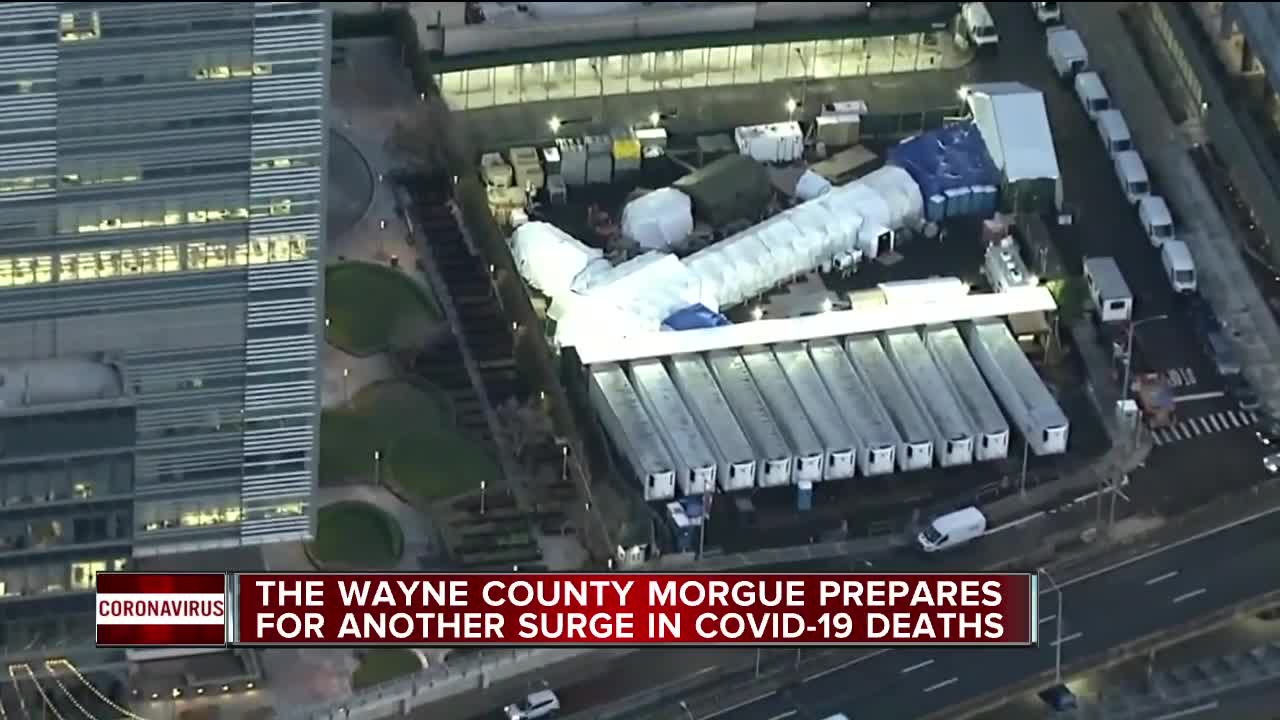DETROIT (WXYZ) — It's difficult to think in numbers when you're talking about the tragedy of losing someone to COVID-19, but that's exactly what Wayne County leaders are having to do, just days away from another expected surge in coronavirus cases and related deaths.
Wayne County and metro Detroit remains one of the hardest hit areas in country by this pandemic; third to New York and New Jersey.
In New York City, hospital morgues are well past capacity due to COVID-19. Some bodies are now stored in refrigerated trailers, and FEMA is sending an additional 85 trucks to help with the overflow.
It's a grim reality – one Wayne County is now preparing for.
Thinking in numbers is so hard when you’re talking about the tragedy of losing a loved one to #COVID19. Sadly, that’s what Wayne County leaders have to do right now, as we brace for another death surge in the coming days and next week @wxyzdetroit pic.twitter.com/8CXgIHFZfO
— Jenn Schanz (@JennSchanzWXYZ) April 8, 2020
“We see that with what happened in New York, with what happened in Europe and China. So we know that there’s going to be a higher number at a much greater concentration of deaths over a shorter period of time," said county spokesperson William Nowling.
Wayne County has secured two cooling trailers, which can store up to 40 bodies each.
The Wayne County Medical Examiner's Office has the capacity to house 300 bodies.
Nowling said there are approximately 200 bodies there now, which is already higher than normal; on average the morgue generally holds between 120-130 deceased.
Those who die at home or not in a hospital are generally taken to the county medical examiner's office as opposed to a hospital morgue; bodies are also brought to a county morgue if a special investigation is required.
As for the two cooling trailers the county has secured, Nowling said they're not in use yet.
“We’re not using them currently but they’re available to use. We have another one coming yet this week. And a fourth one probably coming early next week and that’s going to increase our capacity by 50 percent," he told 7 Action News.
The Michigan Mortuary Response Team, or MI-MORT, is also ready to deploy if needed. They're able to provide mobile cooling units too.
“Our team could respond based upon the state emergency regions, to any potential death surge," said MI-MORT Commander, Tim Schramm.
Schramm said as of Wednesday morning, their two available cooling units have not been deployed.
"The MI-MORT COVID Response Operational Plan continues to evolve every day. We have had numerous communications with County Medical Examiners, County Emergency Managers, Hospital Emergency Managers, helping to provide different solution sets and options," Schramm said via email Wednesday.
Wayne County secured their trailers through a private vendor.
Nowling said some local hospitals, which have their own morgues, are sending some deceased directly to the morgue in Wayne County, adding to their already high numbers.
“Those morgues are getting taxed and stretched to capacity as well," he said.
7 Action News reached out to DMC and Beaumont Health systems on their preparations for adding additional capacity if needed, and are waiting to hear back.
Henry Ford Health System released this statement Friday:
"Like other health systems in our region, we have had to find a temporary solution to navigate the sudden increase in mortality and ease the burden on funeral homes that are not equipped to handle this. We do have refrigeration units that are carefully designed to provide a safe and respectful environment. Our team provides the same level of care and honor when using these units as we do inside our own facilities and we will continue to steward this mission until all of those that we have lost can be moved to their final resting place." -Dr. Betty Chu, M.D., Associate Chief Clinical officer and Chief Quality Officer Henry Ford Health System
Additional Coronavirus information and resources:
Read our daily Coronavirus Live Blog for the latest updates and news on coronavirus.
Click here for a page with resources including a COVID-19 overview from the CDC, details on cases in Michigan, a timeline of Governor Gretchen Whitmer's orders since the outbreak, coronavirus' impact on Southeast Michigan, and links to more information from the Michigan Department of Health and Human Services, the CDC and the WHO.
View a global coronavirus tracker with data from Johns Hopkins University.
Find out how you can help metro Detroit restaurants struggling during the pandemic.
See all of our Helping Each Other stories.
See complete coverage on our Coronavirus Continuing Coverage page.


